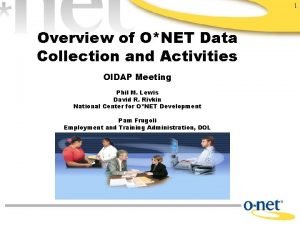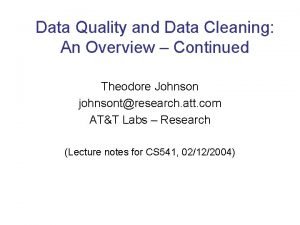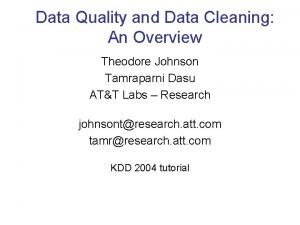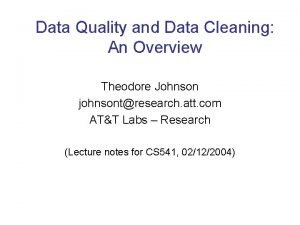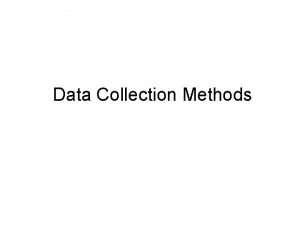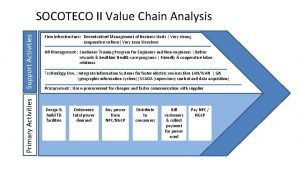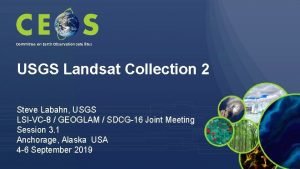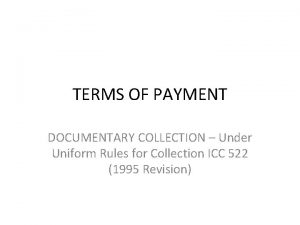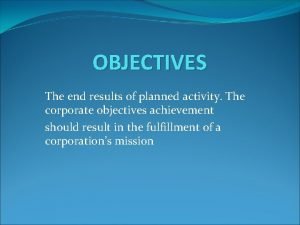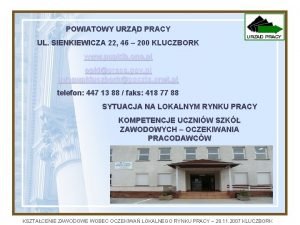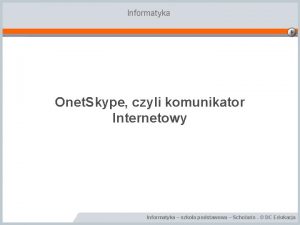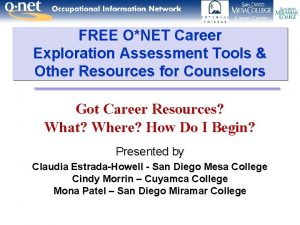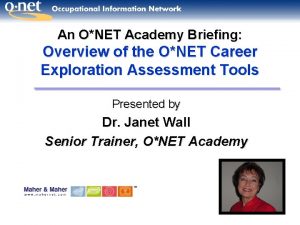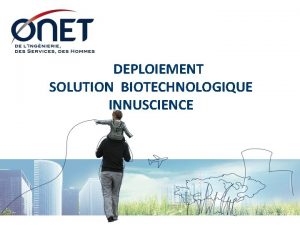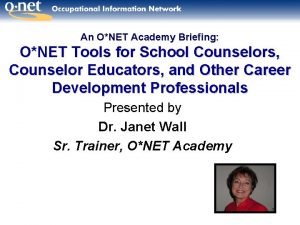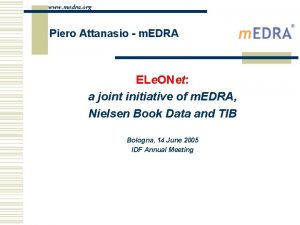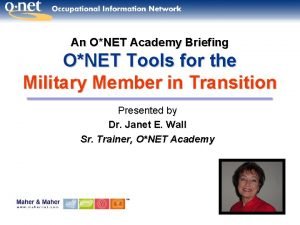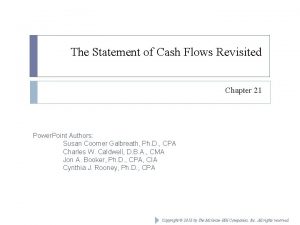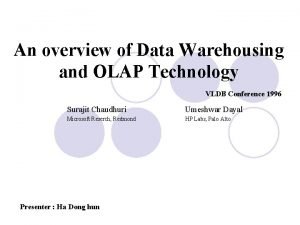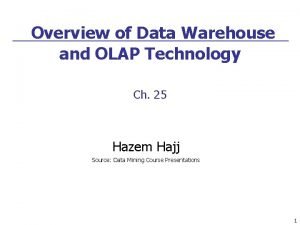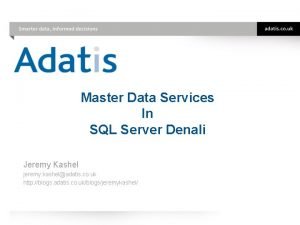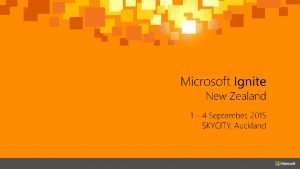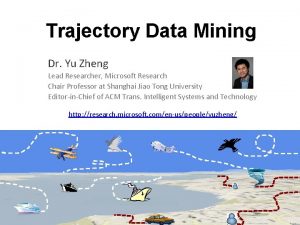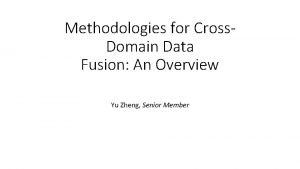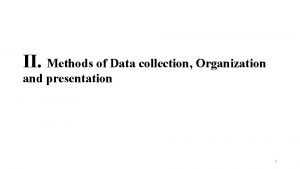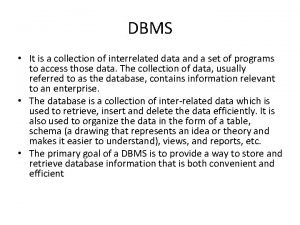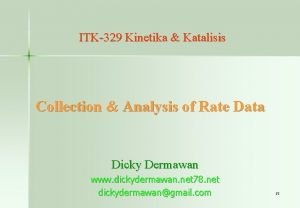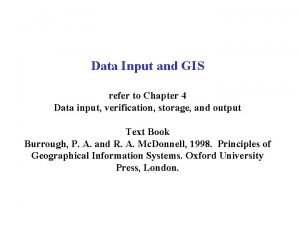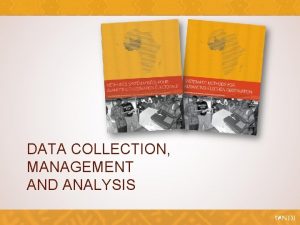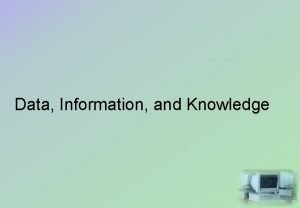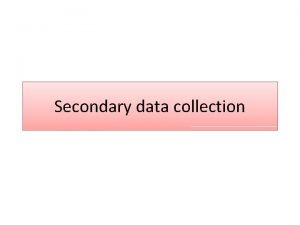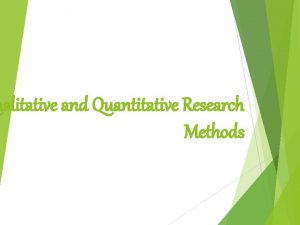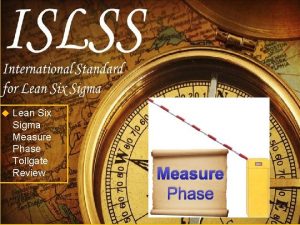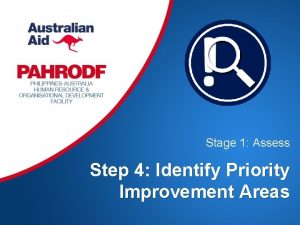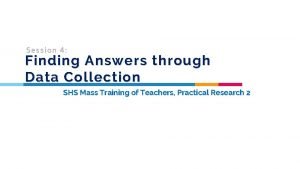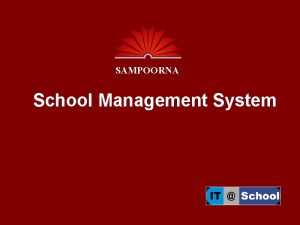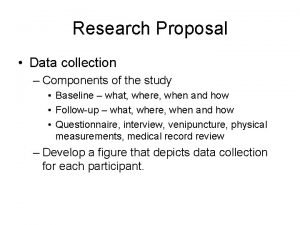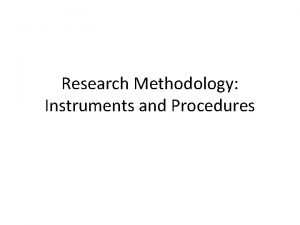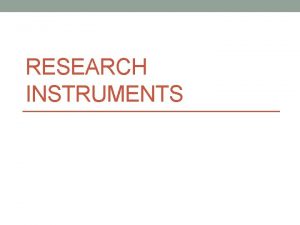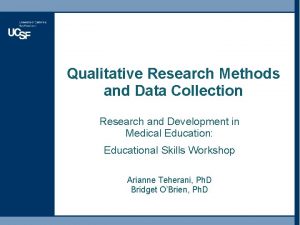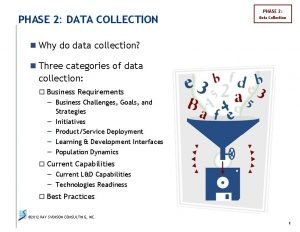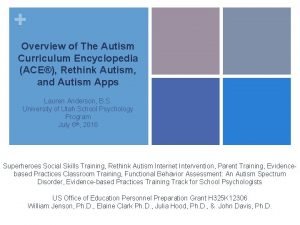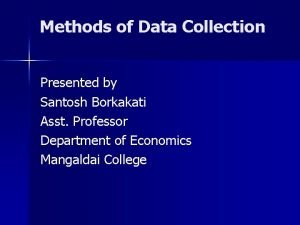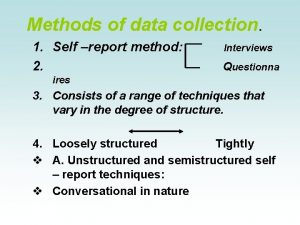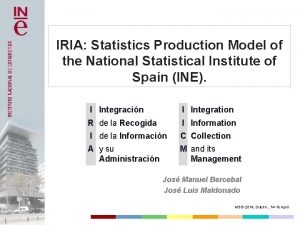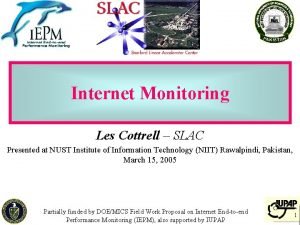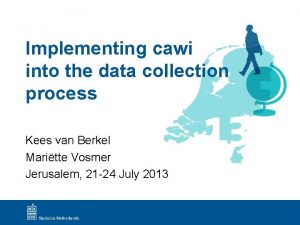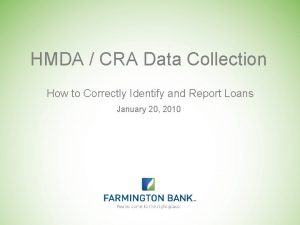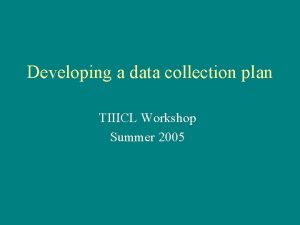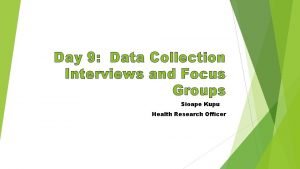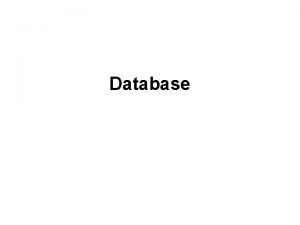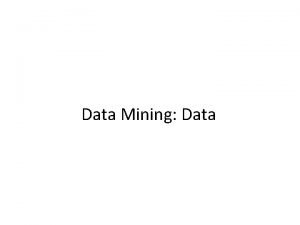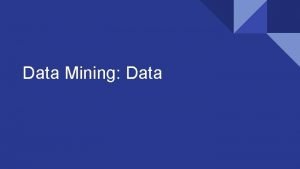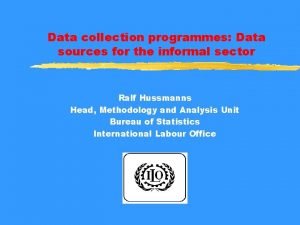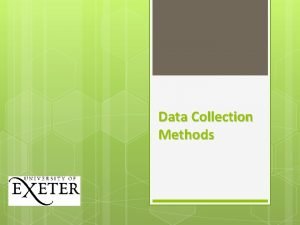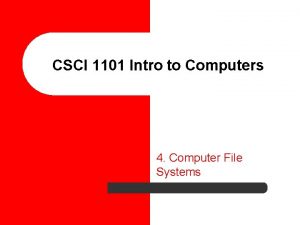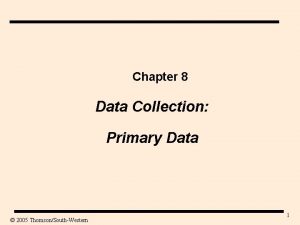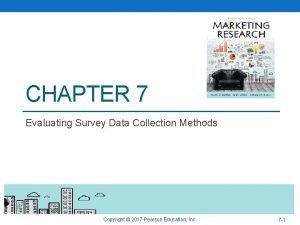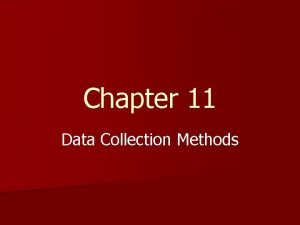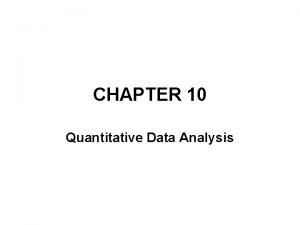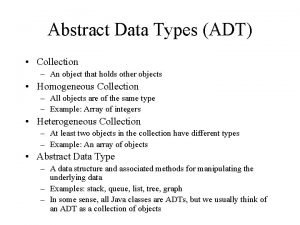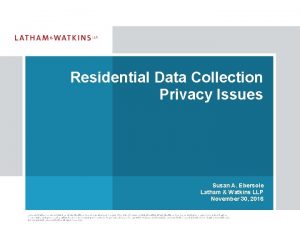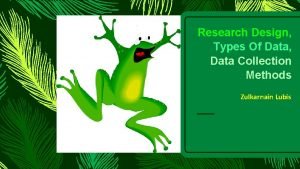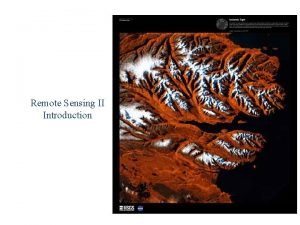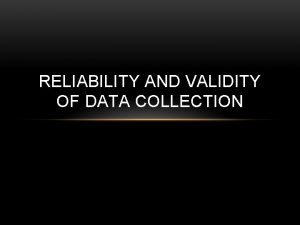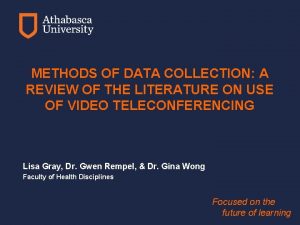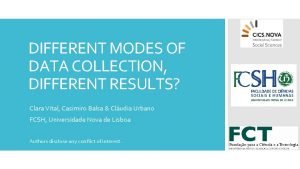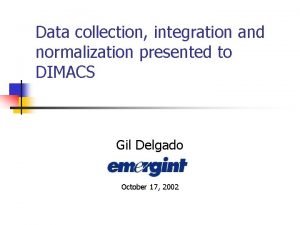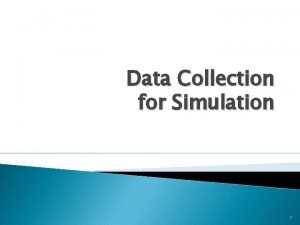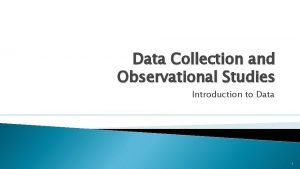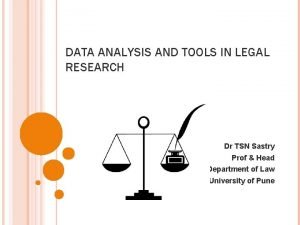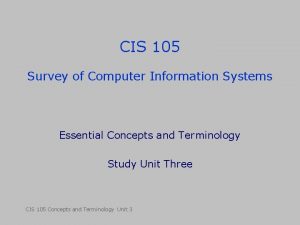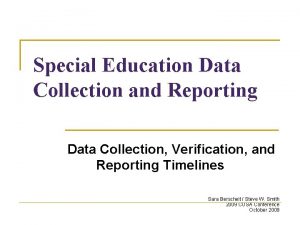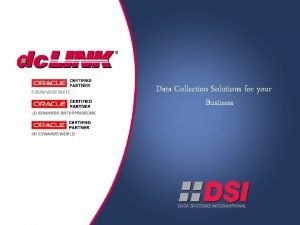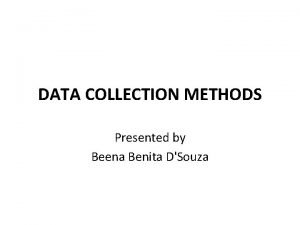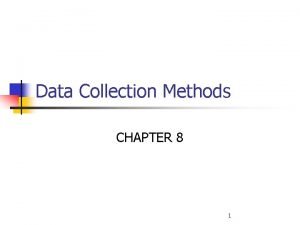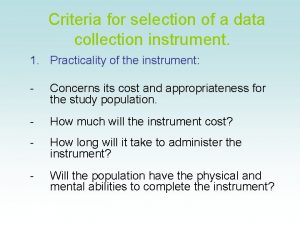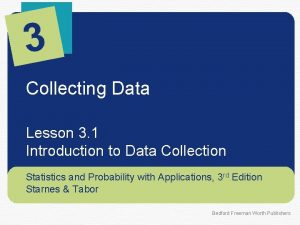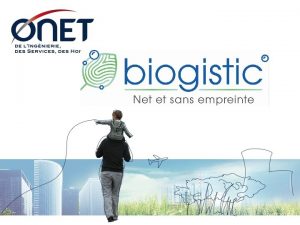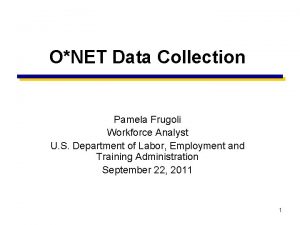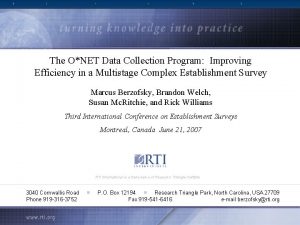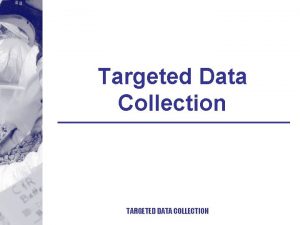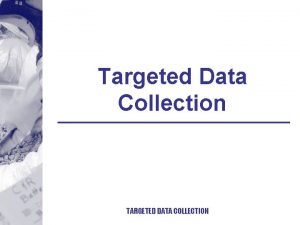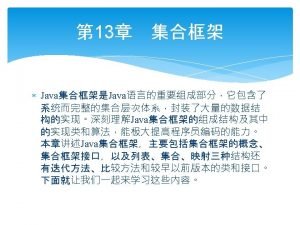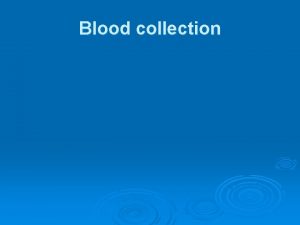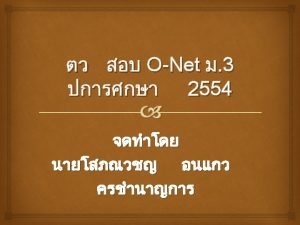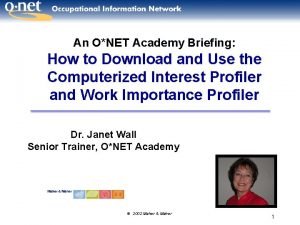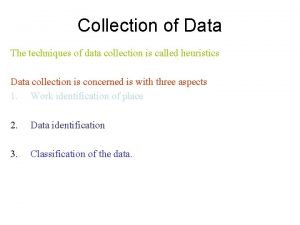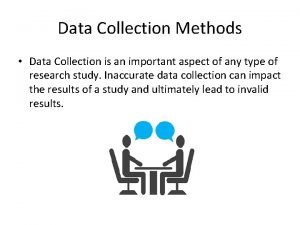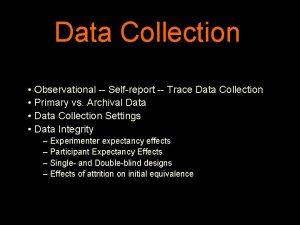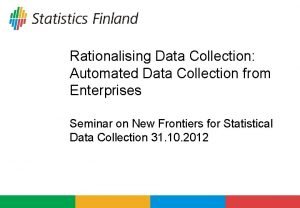1 Overview of ONET Data Collection and Activities





























































































- Slides: 93

1 Overview of O*NET Data Collection and Activities OIDAP Meeting Phil M. Lewis David R. Rivkin National Center for O*NET Development Pam Frugoli Employment and Training Administration, DOL May 4, 2011

2 Goals of the Update Briefing • Overview of O*NET Project • Data Collection Program – Address OIDAP Questions • Products & Tools • O*NET Users • Special Projects

3 OIDAP Questions • Please describe how the O*NET data collection strategy builds upon the BLS Occupational Employment Statistics (OES) database. • Are you still using Dun & Bradstreet data to find establishments? Were OES data not able to accomplish this, or is it an efficiency issue? • What was the original balance between the Establishment Method and the Occupational Expert Method for populating the O*NET database? Has that changed now that you are in maintenance mode? How are the occupational experts identified? • Can you describe the role of the state workforce development offices in data collection for O*NET? Has this changed over time? • Why did O*NET decide not to use field analysts to collect the data on occupations?

4 OIDAP Questions (cont. ) • What are the major challenges associated with identifying employees in specific occupations to observe in the field? • How do Detailed Work Activities differ from Generalized Work Activities in the O*NET? How were they empirically derived? • We understand that a rule of thumb for statistical sufficiency was set at 15 observations for each domain. Are you still satisfied with that number? • Are you planning any changes in procedure or content as a result of the recent review of O*NET by the National Research Council? • How might your sampling parameters change if the results were subject to legal challenge? • What advice do you have for SSA as they begin to develop an OIS for disability adjudication purposes?

5 Overview of O*NET Project

6 Why O*NET? 1980 Work, Jobs, and Occupations: a Critical Review of the Dictionary of Occupational Titles (National Research Council) 1993 Final report of the Advisory Panel on the DOT (APDOT) 1999 The Changing Nature of Work: Implications for Occupational Analysis 2000 O*NET Data Collection Program Survey Pretest 2001 Official OMB approved O*NET data collection using the O*NET survey questionnaires initiated

7 O*NET Project Team • U. S. Department of Labor, Employment & Training Administration • National Center for O*NET Development – North Carolina Employment Security • RTI; MCNC; Hum. RRO; NC State University; Maher & Maher

8 National Center for O*NET Development – Data Collection – Dissemination – Implementation – Research and Development – Technical Assistance/Customer Support

9 What is O*NET? • A “common language” and dynamic system for describing the world of work for both the public and private sectors • A comprehensive system for collecting and disseminating information on occupational and worker requirements

10 What is O*NET? • Flexible competency-based system with emphasis on skills transferability • Framework for organizing job and worker information • Data on occupations covering the entire U. S. Economy

11 What is O*NET? • Uses information technologies to facilitate the collection, storage, and distribution of quality data • A resource for businesses, educators, job seekers, HR professionals, and publicly funded government programs

12 O*NET Structure • The O*NET-SOC Occupational Taxonomy • The O*NET Content Model

13 SOC and O*NET-SOC • SOC mandated by US Office of Management and Budget • Developed by multi-agency initiative

14 Key characteristics of U. S. SOC • Structured for comparability • Unified classification structure • Four hierarchical levels to enable data collectors to choose a level of detail corresponding to their needs and ability to collect data on different occupations

15 SOC and O*NET-SOC • O*NET-SOC is a SOC based classification that provides a greater level of detail as needed – O*NET-SOC 2010 taxonomy released December 2010 – Currently data collected on 974 O*NET-SOCs • Adds 269 more specific occupations – New and emerging – Different tasks and KSAs

16 O*NET Content Model

17 Content Model: Sub-Domains Worker Characteristics Abilities Interests Abilities Work Styles. Cognitive Psychomotor Verbal Physical Verbal Idea Generation & Reasoning Sensory Oral Comprehension Quantitative Written Comprehension Memory Oral Expression Perceptual Written Expression Spatial Attentiveness http: //www. onetcenter. org/content. html

The O*NET Database: Version 15. 1 • Occupation data – Cross-Occupational + Occupation Specific – 230+ variables – Importance, level, frequency – @ 500 ratings per occupation – @ 3500 metadata per occupation Abilities Scales Reference Content Model Reference Educ, Trng & Exp Categories O*NET 15. 1 Database Task Ratings Interests Task Statements Job Zone Reference Knowledge Level Scale Anchors Occupation Data Survey Booklet Locations Task Categories Educ, Trng & Exp Job Zones Skills Supplemental Files • Related Occupations • Crosswalks • Detailed Work Activities • Emerging Tasks • In-Demand • Lay Titles Occupations • Lay Titles • Tools and Technology • Related Occupations • O*NET-SOC 2000 to • Tools and Technology O*NET-SOC 2006 • Tasks (Release 5. 1 File • Work Needs Work Activities Work Context Categories Work Context Work Styles Layout) Occupation Level Metadata • Work Needs Work Values

19 The O*NET Database: Metadata Ratings Level Statistics Occupational Level Statistics • • Confidence Intervals – Lower and upper 95% bounds • Standard Deviation • Standard Error • Sample Size • Flags – Not Relevant for the Occupation – Recommended Suppression • • • O*NET-SOC Establishment Response Rate O*NET-SOC Employee Response Rate O*NET-SOC Case Completeness Rate Total Completes for O*NET-SOC Occupational Level Distribution Statistics • • • Data Collection Mode Current Job Tenure Industry

20 O*NET Data Availability • 874 occupations – Comprehensive data – 359 second update • 100 occupations – Description, task list, lay titles – Majority also have interests, work values, and tools & technology

21 O*NET Data Publication Goals • New database released annually – Minimum of 100 occupations updated • Average currency of all occupations = 2. 59 years • Priority established by DOL – – Maximum 5 years-old Bright Outlook Green occupations Linked to technology, math, and science, computers, engineering, and innovation

22 O*NET Data Currency

23 O*NET Data Collection Program

24 O*NET Data Collection Overview • Proven successful and cost effective methodology designed to collect and yield high quality occupational data • Multi-method approach to provide flexibility within a framework of standardized procedures – Establishment, Occupational Expert, Supplemental Frames, Analyst Ratings, Web-Based • Minimizes public burden and costs • Approved by Office of Management & Budget (OMB)

25 O*NET Data Collection Overview • Continuous data collection since June 2001 – Three successful OMB Clearances • Comprehensive update by job incumbents and occupational experts of the 2006 O*NET-SOC Taxonomy • Transition to 2010 O*NET-SOC – New & Emerging occupations • Unparalleled partnership between Department of Labor and private/public community • 40, 000+ business/organizations • 160, 000+ job incumbents/experts • 450+ National Associations

26 Data Collection Overview (cont. ) • High quality data from a national sample of job incumbents/occupational experts – Strong business participation • 76% plus response rate – Strong employee participation • 65% plus response rate – Strong occupation expert participation • 82% response

27 Data Collection Overview (cont. ) • Web-based case management system used to control all sampling and data collection systems – Case management, BL contacts with establishments, questionnaire and informational mailings, questionnaire processing, inventory control, etc. • Finely tuned procedures, systems and infrastructure capable of surveying multiple occupations simultaneously – Capability developed, tested, and enhanced over 11 years

28 Sources of Occupational Data • Job Incumbents and Occupation Experts – Education, Job Titles, Knowledge, Tasks, Work Activities, Work Context, Work Experience, Work Styles • Occupation Analysts – Abilities, Skills • Web-based Research – Detailed Work Activities, Green, Tasks, Tools and Technologies (T 2)

29 Establishment Method • Two stage sample – Business establishments - POC – Job incumbents within business establishments

30 Establishment Method (cont. ) • Job incumbents complete one of three survey questionnaires (25 -30 minutes) – Generalized Work Activities, Knowledge/Work Styles, or Work Context – Task List – Background Info • Incumbents choose response option – Paper-and-pencil – Web-based (approximately 25%)

31 Design of Collection Waves • Identify ~50 primary occupations to target in a sample wave – Wave X. 1: Designed to get 34% of sample – Wave X. 2: Designed to get 33% of sample – Wave X. 3: Designed to get 33% of sample – Wave X. 4: Sample residual

32 Design of Collection Waves (cont. ) • Each wave is a cluster of similar occupations – Secondary occupations which are found across industries are also included to maximize efficiency • Multiple sub-waves allow for greater precision – Locating occupations – Controlling public burden and project resources

33 Stage One Sampling • OES data from BLS used to determine the initial industry distribution for each occupation • Sample business establishments selected from database of business locations

34 Stage One Sampling (cont. ) • OES data from BLS used to determine the initial industry distribution for each occupation – Indicates which industries occupations are employed in and the share and distribution of occupational employment across industries – Does not contain information on establishments

35 Stage One Sampling (cont. ) • Industry information for each occupation is refined by O*NET Center analysts – Review and face validity checks • For example, religious institution sub-section removed from service industry if sampling for bartenders – Determine industries to include based on overall distribution and population coverage goals – Refined/target by experience from previous updates, when available

36 Stage One Sampling (cont. ) • Sample business establishments selected from a frame of business locations – Dunn & Bradstreet (D&B) database • ~15 Million establishments • Info obtained from multiple sources – Tax records, credit reports, telephone directories • Updated continuously on a monthly basis • Links to SIC and NAICS industry information

37 Population Coverage • Gather data on the “core” of the occupation – Where the majority of incumbents employed – Average coverage level is 85%

38 Population Coverage (cont. )

39 Stage Two Sampling • Led by highly qualified O*NET Business Liaisons (O*NET BL) – Full time staff working in dedicated call center – Educational and work experience criteria higher than typical telephone interviewer • The sampled establishment’s Point-of-Contact (POC) works with the O*NET BL to identify the a list of eligible employees • Identification Profiles (ID Profile) are used when asking POC if occupations are present – Helps ensure accuracy in matching employees to occupations

40 Stage Two Sampling (cont. ) • Automated, random selection of job incumbents from the POC’s eligible list • Limits placed on POC burden – No more than 5 occupations sampled – Never more than 20 employees selected – Can only be included within the data collection once each year • Selected employees – Asked to complete the questionnaire on their own time – Responses remain anonymous and confidential from both the employer and the public • Complete via the web or mail back directly • All individual identifiers removed

41 Model-Aided Sampling (MAS) • Innovative sampling approach that reduces data collection cost and burden to the public by preventing occupations from greatly exceeding their targeted sample – Builds on existing sampling paradigms: traditional and model based – For each occupation, a targeted sample size for specific demographic domains is modeled • Census region • Establishment size • Industry division • Data collection is halted in a MAS cell when the targeted respondent sample size is projected to be achieved

42 Summary of Establishment Method Sample Selection Process

43 Establishment Method Data Collection Protocol

44 Other Key Features • Incentives – Employer • Toolkit for Business – POC • Clock, Certificate of Appreciation – Employee • $10 • Outreach to professional/trade associations increase awareness – Endorsement list provided to POC

45 Supplemental Frame Method • Multiple strategies to augment the establishment data collection – Supplemental Frame Incumbent • Job incumbents are directly accessed via an association listing to complete the data collection – e. g. Industrial Organizational Psychologists – Supplemental Frame Establishment • Targeted employer sample developed via expert contact/associations where the sampling frame coverage is significantly high but is not adequate by itself – e. g. Freight and Cargo Inspectors – Special Frame Establishment • Targeted employer sample completely developed via expert contact/associations where coverage is extremely high • Normal establishment method is bypassed – e. g. Nuclear Power Reactor Operators; Flight Attendants

46 Occupational Experts (OE) Method • Used when occupation is difficult to locate in establishments – Small employment size – Job incumbents inaccessible due to work in remote locations – New and emerging occupations

47 OE Method (cont. ) • Data collected from experts in target occupation – Supervisors, trainers, others with extensive knowledge of occupation • Identify appropriate source organizations (e. g. professional associations) – Good coverage of occupation – Can identify members who are occupation experts – Willing to provide lists of experts

48 OE Method (cont. ) • Select sample from membership lists • Contact, screen, and survey OEs directly – no establishment or POC • OEs complete all three domain questionnaires, background and task questionnaires • OE incentives – clock, Certificate of Appreciation, $40

49 OE Method Data Collection Protocol

50 Analyst Ratings Method • Occupational Analysts Rate the Ability and Skill Domains – Updated occupation information collected from job incumbents used to describe occupation and assist with the rating process – Extensive training and quality assurance procedures

Analyst Rating Process 51

52 Stimulus Material • • • Occupation title and definition Job Zone Important knowledges Mean importance of core and supplementary tasks Mean importance of GWAs that: – Mean > 3. 0 for occupation – Require the targeted ability/skill to be performed • Mean rating of work context statements that: – Mean > 3. 0 for occupation – Require the targeted ability/skill to work in that context

53 Data Collection • Two groups of eight analysts • Both groups first given same 10 occupations • Rate importance and level of 52 abilities and 35 skills • Ratings compared and discussed if warranted • Batches of five occupations/week; different occupations to each group of 8 • Evaluate agreement (SEM); facilitate discussion if SEM >. 51 for importance

54 Analysts Qualifications • 16 Trained Analysts • 5 + years work experience – Currently work for diverse organizations • Marriott, Fed. Ex, SAS, DDI – Not internship, assistantship or summer job • Masters or Ph. D degree in I/O psychology, vocational psychology, human resources (business department) or industrial relations – Graduate level job analysis course (or something comparable) – Graduate level research methods course (or something comparable)

55 Analyst Training • 1 ½ days • Hands-on exercises, quizzes, and rating practice Module 1: History of O*NET Module 2: Overview of Stimulus Materials Module 3: Making Your Ratings Module 4: Recording Your Ratings • Refresher training

56 Web-Based Method • Trained analysts collect and process more specific occupational information from industry, professional, labor, and educational organizations – – – Scan internet for existing information linked to O*NET-SOC Collect tasks and detailed information Compile data, analyze data/expert review Organize using standardized taxonomies Generate final output

57 Special Projects

58 Revision of Data Collection Instruments • Variety of cognitive methods used to evaluate the content and design of the initial O*NET data collection surveys – Expert evaluation (cognitive forms appraisal) – Expanded interviews with individual respondents – Focus group interviews • Results led to significant enhancements to the instruments while maintaining comparability to theoretical underpinnings of the variables and taxonomies, as well their psychometric qualities – Simplification of instructions and layout – Reduction in the number of items and scales per item – Wording changes to specific variable definitions • Current item response rate range 96 -99% http: //www. onetcenter. org/reports/Data_appnd. html

59 O*NET Integration Projects • Occupational Code Assignment – • Lay titles – – • Military Occupational Classification (MOC) Registered Apprenticeship Partners Information Data System (RAPIDS) Classification of Instructional Programs (CIP) Dictionary of Occupational Titles (DOT) Standard Occupational Classification (SOC) O*NET Online Applications – – – • 50, 000+ titles Average of 57 titles linked per occupation Crosswalks – – – • Formal request of an assignment of a job/occupation to the O*NET-SOC Taxonomy Browse by Career Cluster Browse by Bright Outlook Browse by Industry Browse by Job Family Browse by Science Technology Engineering & Math (STEM) O*NET Occupation Browser – – CD-ROM based version of O*NET Online Designed for organizations serving populations with little to no access to the internet

60 O*NET Career Exploration Tools Tool Format Purpose O*NET Interest Profiler (IP) Paper/Pencil Work-related Interests Standalone or Network Work-related Interests O*NET Work Importance Locator (WIL) Paper/Pencil What is Important in a Job (Values) O*NET Work Importance Profiler (WIP) Standalone or Network What is Important in a Job (Values) O*NET Computerized Interest Profiler (CIP) O*NET Ability Profiler (AP) Paper/Pencil http: //www. onetcenter. org/tools. html What Individual Can Do Well (Ability)

61 Tools and Technology (T 2) • Machine, Equipment, Tools, and Software workers must be able to use for optimal functioning in a high performance workplace – This is what employers refer to as “Hard Skills” – Emphasis placed on cutting edge technologies and emerging workplace practices http: //online. onetcenter. org/link/summary/17 -2081. 00

62 Tools and Technology (T 2) • 620 occupations populated – All green occupations • 43, 000 objects • 76 objects per occupation on average – Range = 12 -300

63 T 2 Development • Internet based data collection – Build on previous O*NET project tasks (i. e. , task development) – Trained analysts • Strong proficiency in Internet searching procedures • Strong background and training in occupational analysis

64 T 2 Development (cont. ) • Data classification – United Nations Standard Products and Services Code classification system (UNSPSC) • Quality control • Customer input – Feedback via O*NET Online & O*NET Resource Center http: //www. onetcenter. org/t 2/ – Transactional analysis of DOL’s Job Description Writer

65 O*NET New & Emerging (N &E) Project • 154 New & Emerging Occupations Identified – – – Significantly different work from existing O*NET-SOCs Not adequately reflected in current classification Significant employment Positive projected growth rate Education, credentialing, certification programs Related professional associations http: //www. onetcenter. org/reports/New. Emerging. html

66 O*NET N & E Project (cont. ) • Investigated 17 In-Demand Industries – – – – – Advanced Manufacturing Aerospace Automotive Biotechnology Construction Education Energy Financial Services Geospatial Technology – – – – Green Health Care Homeland Security Hospitality Information Technology Nanotechnology Retail Transportation

67 O*NET N & E Project (cont. ) • Extensive Web Search Conducted by Trained Occupational Analysts: – Industry Associations and Organizations – Educational Programs – Job posting sites • Information Gathered, Documented, and Detailed Criteria for Inclusion Applied

68 O*NET N & E Project (cont. ) • Trained occupational analysts conduct extensive web searches to investigate each industry – Background of industry (i. e. , when industry started changing) – Major innovations in industry – Employment trends – New products – Government regulations (e. g. , Automotive Emissions Standards)

37 New Health Care O*NET-SOCs • • 13 -1199. 02 19 -3039. 01 • • • 21 -1019. 01 29 -1069. 02 29 -1069. 03 29 -1069. 04 29 -1069. 05 29 -1069. 06 29 -1069. 07 29 -1069. 08 29 -1069. 09 • • • 29 -1069. 10 29 -1069. 11 29 -1069. 12 29 -1069. 13 29 -1129. 01 • • 29 -1199. 01 29 -1199. 02 29 -1199. 03 29 -1199. 04 Patient Representatives Neuropsychologists and Clinical Neuropsychologists Genetic Counselors Allergists and Immunologists Dermatologists Hospitalists Naturopathic Physicians Neurologists Nuclear Medicine Physicians Ophthalmologists Pathologists Physical Medicine and Rehabilitation Physicians Preventive Medicine Physicians Radiologists Sports Medicine Physicians Urologists Low Vision Therapists, Orientation and Mobility Specialists, and Vision Rehabilitation Therapists Acupuncturists Informatics Nurse Specialists Acute Care Nurses Advanced Practice Psychiatric Nurses • • 29 -1199. 05 29 -1199. 06 29 -1199. 07 29 -1199. 08 29 -2099. 01 29 -2099. 02 29 -2099. 03 • • 29 -2099. 04 29 -2099. 05 • 29 -2099. 06 • • • 29 -2099. 07 29 -2099. 08 29 -9099. 02 31 -9099. 01 31 -9099. 02 31 -9099. 03 69 Clinical Nurse Specialists Critical Care Nurses Nurse Anesthetists Nurse Practitioners Cytogenetic Technologists Cytotechnologists Electroneurodiagnostic Technologists Hearing Instrument Specialists Histotechnologists and Histologic Technicians Ophthalmic Medical Technologists and Technicians Orthoptists Nurse Midwives Anesthesiologist Assistants Endoscopy Technicians Speech-language Pathology Assistants

70 Greening of the World of Work • Investigated the implications for the O*NET System - Current O*NET-SOC Taxonomy - N & E Occupations • “Green Economy” economic activity related to reducing the use of fossil fuels, decreasing pollution and greenhouse gas emissions, increasing the efficiency of energy usage, recycling materials, and developing and adopting renewable sources of energy.

71 Green Economy Sectors • • • Renewable Energy Generation Transportation Energy Efficiency Green Construction Energy Trading Energy and Carbon Capture Research, Design, and Consulting Services Environment Protection Agriculture and Forestry Manufacturing Recycling and Waste Reduction Governmental and Regulatory Administration

72 Greening of Occupations • The extent to which green economy activities and technologies increase the demand for existing occupations, shape the work and worker requirements needed for occupational performance, or generate unique work and worker requirements

73 Greening of Occupations (cont. ) • Green Increased Demand Occupations: – increase in the employment demand for an existing occupation – changes in work context – few if any significant changes in work (tasks) and worker requirements of the occupation • Green Enhanced Skills Occupations: – significant changes in work and worker requirements – essential purposes of the occupation remain the same, but tasks, skills, knowledge, and external elements, such as credentials, have changed – may or may not result in an increase in employment demand for the occupation • Green New & Emerging Occupations: – impact of green economy activities and technologies creates unique work and worker requirements, which results in the generation of a new occupation relative to the O*NET taxonomy. – The new occupation could be new or “born” from an existing occupation

74 O*NET Green Results • Green Increased Demand Occupations: – 64 O*NET-SOC occupations • Geological and Petroleum Technicians; Locomotive Engineers; Architectural Drafters; Chemists; Natural Science Mangers; Agricultural Inspectors • Green Enhanced Skills Occupations: – 60 O*NET-SOC occupations • Power Plant Operators; Electrical Engineers; Heating and Air Conditioner Mechanics and Installers; Roofers; Nuclear Engineers; Construction Managers; Farmers and Ranchers; Hazardous Materials Handlers

75 O*NET Green Results (cont. ) • Green New & Emerging Occupations: – 91 N & E Occupations (13 waitlisted) • Logistic Engineers, Fuel Cell Engineers, Energy Auditors, Precision Agriculture Technicians, Photonics Engineers, Robotics Technicians, Manufacturing Engineering Technologists • Wind Turbine or Farm Engineers, Wind Turbine Service Technicians, Biofuels Plant Operators, Solar Power Plant Technicians, Solar Sales Representatives/Assessors, Weatherization Technicians/Installers, Carbon Credit Traders

76 Detailed Work Activities (DWAs) • Detailed job behaviors required across multiple occupations • More detailed and more specific to a finer set of occupations than Generalized Work Activities (GWAs) • Linked to and organized by GWAs • Less specific than unique occupation tasks • 2000+ statements • 30, 000+ linkages

77 Original DWA Development • 2000 to 2002 • Original statements developed to help clients perform skills matching • Oregon State • Classification of Instructional Programs, OES data, DOT data • Transactional data from employers in Oregon • Statements linked to O*NET occupations, new statements added to increase coverage, increase consistency, reduce redundancy • Labor Exchange Skills Project sponsored by DOL • Rational review by occupational analysts • Further refinement and enhancement of statements • National Center for O*NET Development • Rational review by occupational analysts

78 Current DWA Project • Develop new DWAs statements with direct linkages to tasks statements and GWAs • Occupational analyst rating project • Builds on previous database • Identify new Green and Healthcare related DWAs • Populate the 2010 O*NET-SOC taxonomy • O*NET New and Emerging occupations • Other new occupations and changes

79 Spanish Translations of O*NET Questionnaires • Now available along with the previously available generic, customizable versions in English • Can be used as a starting point to collect occupational data in support of a wide range of economic/workforce investment activities and human resource management functions • http: //www. onetcenter. org/questionnaires. html

80 O*NET Toolkit for Business • Information of the features of O*NET and its many uses for human resource professionals and businesses • On-screen and print version http: //www. onetcenter. org/toolkit. html

81 O*NET Products & Tools

82 O*NET Products & Tools • Where Can O*NET Products & Tools be found? – O*NET Resource Center (www. onetcenter. org) • • Databases Classification & Crosswalks About O*NET & O*NET Content Model Career Exploration Tools • Toolkit for Business • Questionnaires • Research & Technical Reports • Links to Related Sites – Incorporated within Private, Not-for-Profit, and Government tools and systems

83 O*NET Products & Tools • O*NET Database (www. onetcenter. org) – Core Database – Supplemental Files (e. g. , lay titles, DWAs, crosswalks) – Production versus Development • O*NET On. Line (www. onetonline. org) – Variety of search options – Detailed occupation information • My Next Move (www. mynextmove. org) – Easy-to-use search and career overviews – Web-based Interest Profiler • O*NET Code Connector (www. onetcodeconnector. org) – Occupational coding assistant

84 O*NET Products & Tools (Cont. ) • O*NET Career Exploration Tools – Interest Profiler – Work Importance Profiler/Locator – Ability Profiler • Training and E-Learning (http: //www. onetacademy. com/) – 60, 000+ registered participants • Technical Assistance – Testing & Assessment Guides – Implementation guidance • Customer Service – onet@ncmail. net (www. onetcenter. org)

85 O*NET Widespread Use O*NET Downloads Jan 2002 – Dec 2010 Product Database Number of Downloads 82, 968 Career Exploration Tools Ability Profiler 173, 744 Interest Profiler 201, 085 Work Importance Locator 96, 409 Computerized IP, WIP 142, 128 Total Career Exploration Tools 613, 366 Other (e. g. , Toolkit for Business) 134, 434 TOTAL O*NET PRODUCTS 830, 768

86 O*NET Widespread Use (cont. ) O*NET Website Statistics - 2010 O*NET Online average visits per month linked sites 1. 1 million 14, 496 O*NET Resource Center average visits per month linked sites 305, 000 4, 223 O*NET Code Connector average visits per month linked sites TOTAL VISITS PER MONTH TOTAL LINKED SITES 63, 000 1, 585 1. 4 million + 20, 304

87 Who uses O*NET? Students and Youth Job Seekers Training Specialists International Military Educators HR Professionals Researchers Community Development Employers Career Counselors Government Officials and Policy Makers

Sample of O*NET Users • • • • • • Manpower Microsoft American Foundation for the Blind Booz, Allan, & Hamilton IBM ACT Torque Bill and Melinda Gates Foundation The Boys and Girls Club of American Catholic Community Services Community Preservation and Development Corporation Arizona State University CRESMET Center Colorado State University Department of Psychology Harvard Business School Lehigh Carbon Community College Temple University Seattle Washington Public School Army Research Institute Federal Reserve Bank of New York U. S. Navy U. S. Department of Defense • • • • • National Institutes for Health Alabama Department of Rehabilitation California Employment Development Department Connecticut Department of Labor U. S. Department of Labor, Employment and Training Administration Main Department of Labor NCESC—Job Connector State of Montana Human Resources Division Texas Labor Market and Career Information Department USAID Cornell University Canadian International Education Development Company E-Career Guidance. Com (Ireland) NKOKA (South Africa) Technical Education and Skills Development Authority (Philippines) JNET ( Japan) U 21 Global (includes 21 Universities in 11 countries) UK Commission for Employment and Skills (United Kingdom) 88

89 Employers Using O*NET • • • Human Resources Personnel Business Forecasters Industry Analysts Organizational Consultants Workforce and Economic Development Specialists • Curriculum Developers • Researchers

90 Individuals Using O*NET • • Career exploration Career development Job search Employment transitions

91 Department of Labor Employment & Training Administration • my. Skills my. Future • America’s Career Info. Net and Career. One. Stop E-Tools • Foreign Labor Certification • Apprenticeship

92 One-Stop Partners: • • • Career Counselors Interviewers Rehabilitation Counselors Veterans’ Representatives Training Providers Business Consultants

93 Questions, Feedback, Additional Input? www. onetcenter. org online. onetcenter. org or Customer Service National Center for O*NET Development: e-mail: onet@ncmail. net
 Onet statistics
Onet statistics Data cleaning problems and current approaches
Data cleaning problems and current approaches Data quality and data cleaning an overview
Data quality and data cleaning an overview Data quality and data cleaning an overview
Data quality and data cleaning an overview Define data collection method
Define data collection method Indoor activities
Indoor activities Primary and support activities
Primary and support activities Primary activities definition
Primary activities definition Landsat collection 1 vs collection 2
Landsat collection 1 vs collection 2 Clean collection vs documentary collection
Clean collection vs documentary collection The terms external secondary data and syndicated
The terms external secondary data and syndicated Planned activities examples
Planned activities examples Urzad pracy kluczbork
Urzad pracy kluczbork Skype onet
Skype onet Onet assessment
Onet assessment Tioamidy
Tioamidy Poczta onet
Poczta onet Poczta onet
Poczta onet O net ability profiler
O net ability profiler Onet work importance profiler
Onet work importance profiler Extranet prodim
Extranet prodim O*net work importance profiler
O*net work importance profiler Vp poczta
Vp poczta Onet
Onet Eleonet
Eleonet Onet thailand
Onet thailand Onet work importance profiler
Onet work importance profiler The statement of cash flows helps users
The statement of cash flows helps users Chicago time
Chicago time An overview of data warehousing and olap technology
An overview of data warehousing and olap technology Master data services overview
Master data services overview Microsoft master data services
Microsoft master data services Trajectory data mining an overview
Trajectory data mining an overview Methodologies for cross-domain data fusion: an overview
Methodologies for cross-domain data fusion: an overview Collection organization and presentation of data
Collection organization and presentation of data Hardware is collection of interrelated data
Hardware is collection of interrelated data Collection and analysis of rate data
Collection and analysis of rate data Gis data input
Gis data input Data collection management and analysis
Data collection management and analysis Data raw facts
Data raw facts Primary data
Primary data Data analysis in research sample
Data analysis in research sample Quantitative research words
Quantitative research words Tollgate review
Tollgate review Identifying priority improvement areas
Identifying priority improvement areas Finding answer through data collection
Finding answer through data collection Sampoorna school
Sampoorna school Data collection in research proposal
Data collection in research proposal Definition of terms in research
Definition of terms in research Research instruments examples
Research instruments examples Define data collection method
Define data collection method Data collection phase
Data collection phase Ace autism curriculum encyclopedia
Ace autism curriculum encyclopedia Pantry audit in research methodology
Pantry audit in research methodology Self report method
Self report method Iria statiris
Iria statiris Network data collection at slac
Network data collection at slac Cawi data collection
Cawi data collection Cra loan data collection grid
Cra loan data collection grid Data collection plan
Data collection plan Interview method of data collection
Interview method of data collection
 Collection of data objects
Collection of data objects Discretization and binarization in data mining
Discretization and binarization in data mining Informal data collection
Informal data collection A major advantage of primary data collection is that
A major advantage of primary data collection is that Instrument for research data collection
Instrument for research data collection A named collection of data on a storage medium
A named collection of data on a storage medium Quantitative vs qualitative data collection
Quantitative vs qualitative data collection Structured undisguised questionnaire
Structured undisguised questionnaire Survey method of data collection
Survey method of data collection Observational data collection method
Observational data collection method Data collection in research example
Data collection in research example Abstract data type (adt)
Abstract data type (adt) Residential data collection
Residential data collection Types of data collection methods
Types of data collection methods In situ data collection
In situ data collection Mean count per interval ioa
Mean count per interval ioa Conclusion of data collection
Conclusion of data collection Modes of data collection
Modes of data collection Data collection integration
Data collection integration Simulation data collection
Simulation data collection Tems data collection
Tems data collection Observational study data collection
Observational study data collection Legal analysis methods
Legal analysis methods Storage device that uses laser technology
Storage device that uses laser technology Primary data geography
Primary data geography Special education data collection
Special education data collection Data collection solutions
Data collection solutions Data collection methods observation
Data collection methods observation Data collection objectives
Data collection objectives Criteria for data collection
Criteria for data collection Lesson 3.1 introduction to data collection
Lesson 3.1 introduction to data collection Student engagement data
Student engagement data
